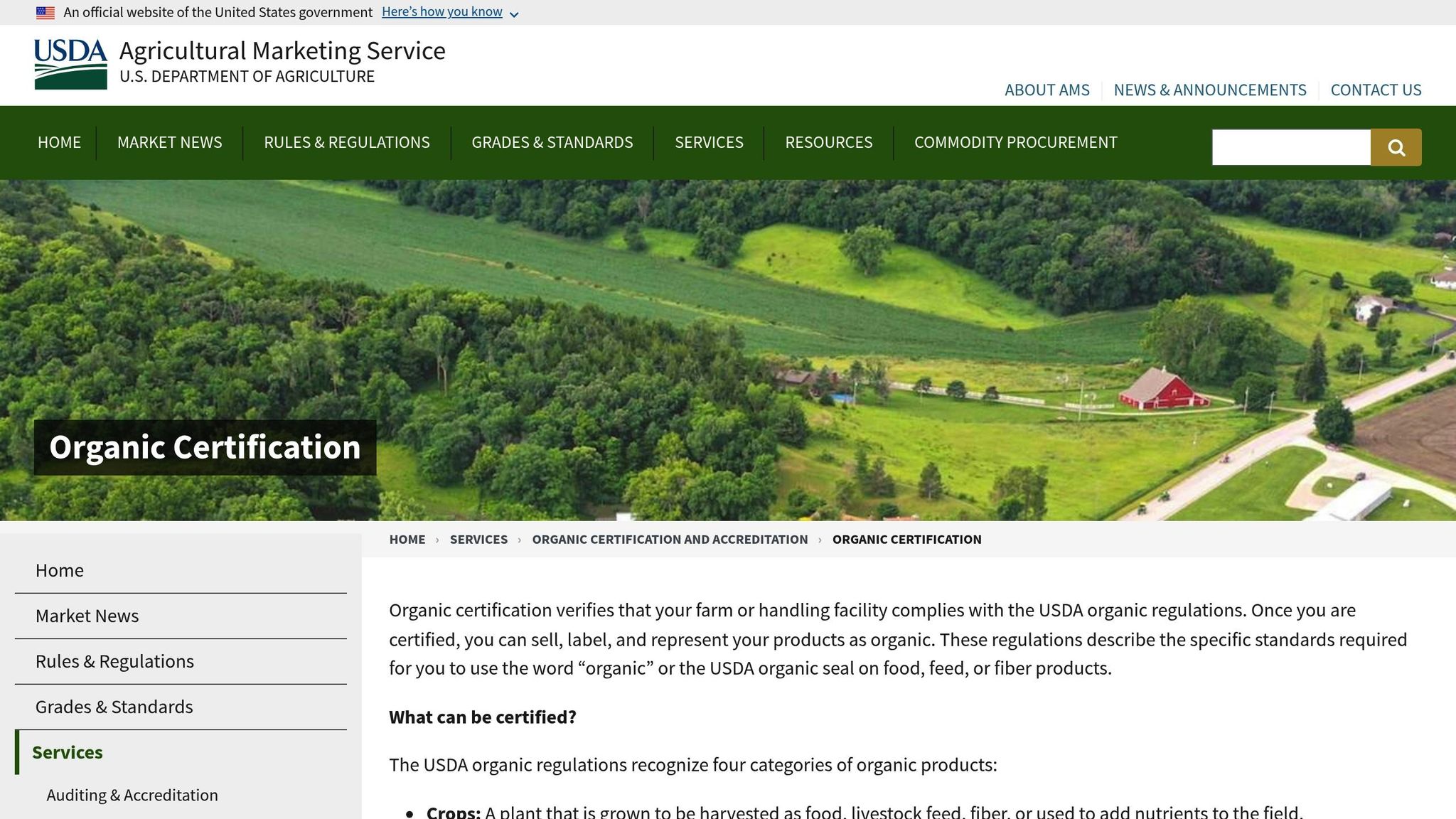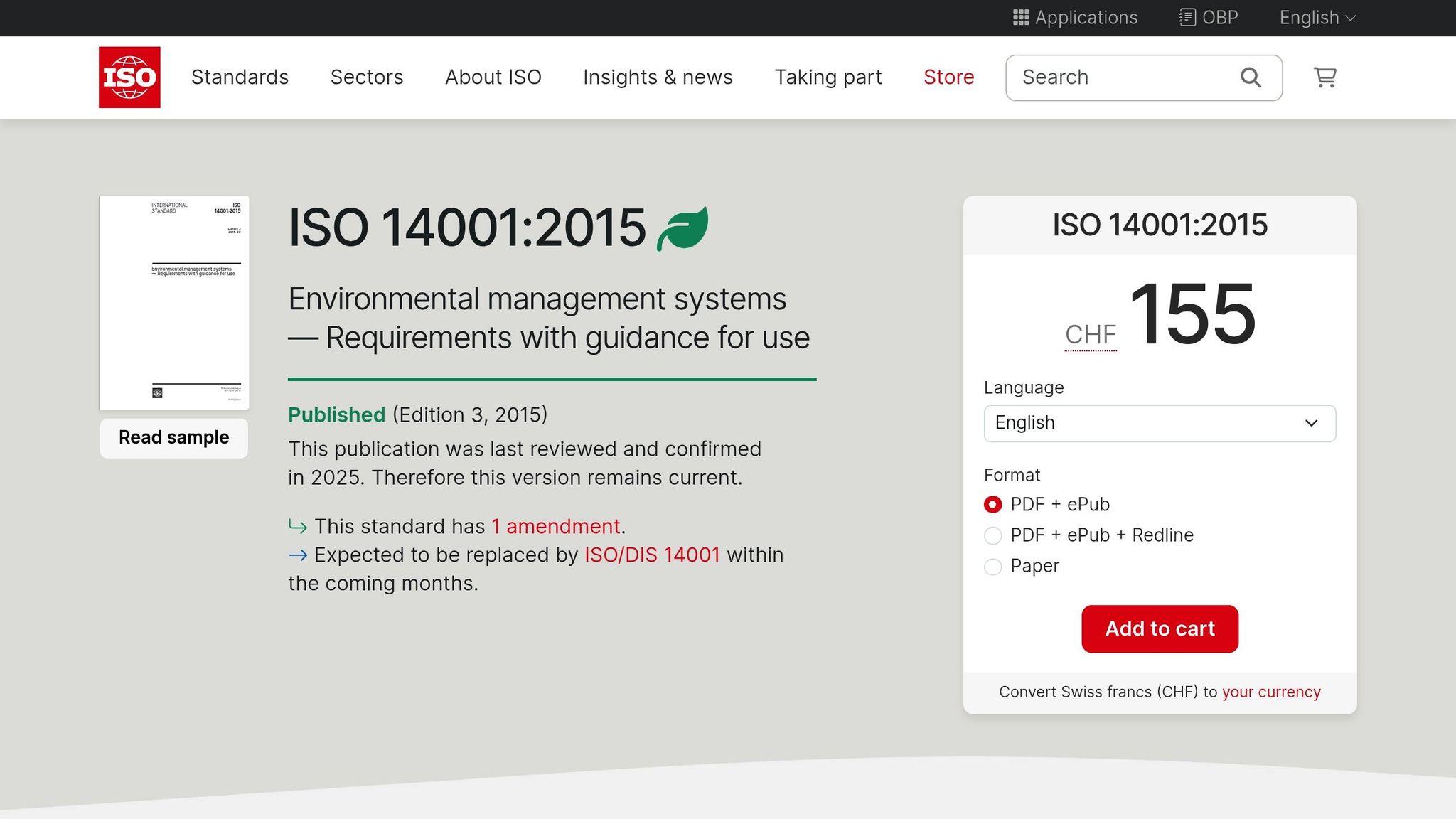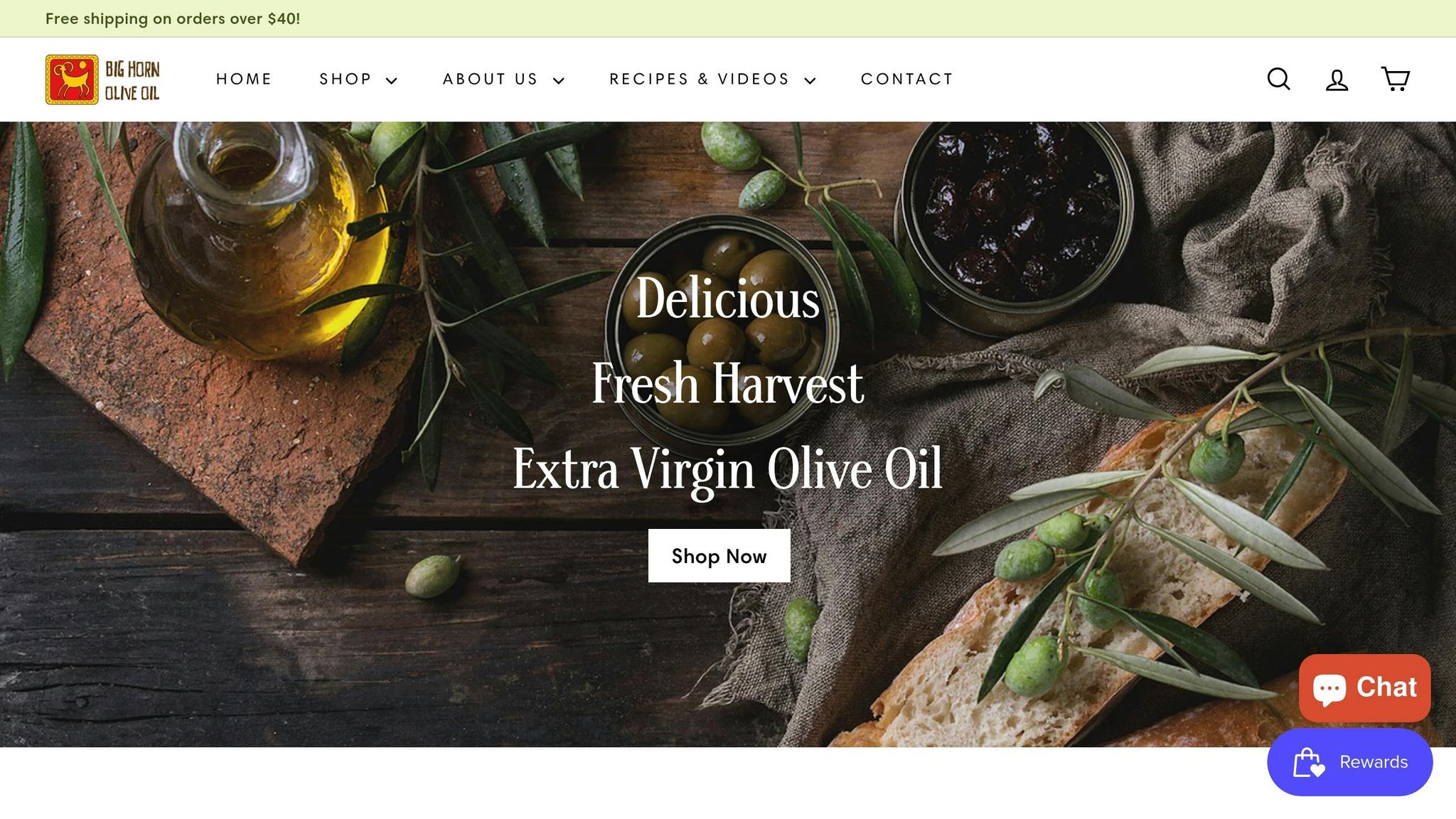Sustainability Certifications for Olive Oil Producers
Sustainability certifications help olive oil producers meet eco-friendly standards and appeal to conscious consumers. These certifications ensure responsible practices in farming, production, and packaging. They also provide transparency, traceability, and market advantages for producers while addressing challenges like water usage, soil health, and carbon emissions.
Key certifications include:
- PDO & PGI: Protect regional authenticity and production methods.
- USDA Organic: Focuses on natural farming without synthetic inputs.
- Carbon Neutral & ISO 14067: Measure and reduce carbon footprints.
- ISO 14001: Guides producers in reducing their environmental impact.
These certifications benefit producers by uncovering inefficiencies, improving operations, and enabling premium pricing. For consumers, they ensure quality and ethical production.
Big Horn Olive Oil integrates these principles by prioritizing quality, traceability, and responsible practices, offering products that align with both consumer values and industry standards.
Olive Oil in the Plant-Forward Kitchen Interview Series: Kiki Zinoviadou
Checklist of Key Sustainability Certifications
Sustainability certifications play a crucial role in helping olive oil producers showcase their commitment to environmentally responsible practices. These certifications cover a range of standards, from preserving traditional methods to implementing structured environmental management systems. They also promote transparency and traceability in supply chains, which are increasingly valued by consumers.
Protected Designation of Origin (PDO) and Protected Geographical Indication (PGI)
PDO and PGI are certifications backed by the European Union, designed to ensure the authenticity of an olive oil's origin and production methods. PDO requires that every stage of production - cultivation, processing, and packaging - takes place in a specific region using traditional techniques. PGI, on the other hand, allows more flexibility in production location while still preserving the regional characteristics of the product. Both certifications involve regular inspections and detailed documentation to maintain their standards.
USDA Organic Certification

The USDA Organic seal is widely recognized in the United States as a marker of sustainable agricultural practices. This certification prohibits the use of synthetic pesticides, herbicides, and fertilizers, requiring a three-year transition period for compliance. Producers must prioritize soil health by incorporating practices like composting and cover cropping. To maintain certification, producers are subject to annual inspections and must keep detailed records of their farming activities.
Carbon Footprint and Carbon Neutral Certifications
Certifications focused on carbon emissions help producers measure and reduce their environmental impact. For instance, ISO 14067 provides guidelines for calculating the carbon footprint of olive oil production, covering everything from farming and processing to packaging and transportation. Carbon neutral certifications go a step further, requiring producers to offset any remaining emissions through verified projects. These certifications often rely on lifecycle assessments to identify areas for improvement and ensure operational efficiencies.
ISO 14001 Environmental Management

ISO 14001 sets out a framework for creating an environmental management system aimed at continuous improvement. Producers must establish clear environmental policies, set measurable goals, and undergo regular audits. This certification helps manage key areas like energy use, waste reduction, and water conservation, ensuring that environmental impact is minimized over time.
How Certifications Ensure Traceability and Transparency
Sustainability certifications establish systems that meticulously track olive oil from its source to the final consumer. This process builds trust by documenting every critical production step, ensuring claims about environmental responsibility and product quality can be verified.
At the heart of this system lies thorough monitoring of the supply chain.
Supply Chain Monitoring
Certifiers require tracking systems, such as ISO 22005:2007, to log the olive oil’s origin and key production stages. These systems can either cover the entire supply chain or focus on particularly sensitive areas. Producers are tasked with verifying the origin of their olives and documenting essential steps in the production process. By doing so, they demonstrate a clear commitment to transparency and accountability.
Record-Keeping and Audits
Transparent practices rely heavily on detailed record-keeping, which supports regular audits to ensure compliance with certification standards. These audits often include on-site inspections where facilities and records are reviewed to confirm that documented processes align with actual practices. The frequency of these audits depends on the specific certification.
Organizations like the California Olive Oil Council may also require additional testing, such as chemical analyses for free fatty acids and peroxide levels, alongside sensory evaluations conducted by trained panels. A robust system of record-keeping creates a reliable paper trail, reinforcing the credibility of claims about the olive oil’s production quality and methods.
Producer Responsibility and Carbon Emission Reduction
Certifications push producers to embrace eco-friendly practices and actively work to lower carbon emissions. These standards are not just about meeting basic requirements - they demand tangible improvements in environmental impact. By blending responsible farming techniques with precise carbon management, producers can align with sustainability goals in a meaningful way.
Responsible Farming Practices
To meet certification standards, producers must adopt farming techniques that protect the environment while maintaining product quality. For example, USDA Organic certification prohibits the use of synthetic pesticides and fertilizers, reducing soil contamination and promoting healthier ecosystems.
Water management is another critical focus. Techniques like precision irrigation and the use of drought-resistant plant varieties help conserve water without compromising crop yields. Similarly, soil health initiatives, such as cover cropping and composting, play a dual role: they improve soil structure and boost carbon sequestration. These methods not only enhance the health and lifespan of olive trees but also deliver long-term economic and environmental gains.
Biodiversity is equally important. Certifications encourage the preservation of natural habitats within olive groves, which supports beneficial insects and wildlife. This approach reduces reliance on chemical pest control and fosters more resilient agricultural systems. By integrating these practices, producers can also improve carbon emissions tracking and reduction efforts.
Carbon Accounting and Offsetting
Sustainability certifications increasingly emphasize the need for producers to measure, report, and reduce their carbon emissions. Frameworks like ISO 14067 guide producers in calculating the carbon footprint of olive oil products, covering every stage - from cultivation and harvesting to processing and packaging.
Carbon accounting begins with identifying baseline emissions. Producers track energy use, fuel consumption, and emissions from processing facilities to pinpoint areas for improvement. This data forms the foundation for effective carbon management strategies.
Offset programs are another key requirement of certifications. Producers invest in renewable energy projects or reforestation initiatives to neutralize their emissions. These programs often involve third-party verification to ensure the environmental benefits are real and measurable.
Energy efficiency upgrades offer one of the fastest ways to cut emissions. Producers are adopting renewable energy solutions, upgrading machinery to more energy-efficient models, and optimizing transportation routes. These changes can significantly reduce operational emissions in a relatively short timeframe.
Lastly, certifications encourage a full lifecycle perspective. Producers are urged to evaluate the environmental impact of every stage in their supply chain, from the materials used in packaging to distribution methods and disposal practices. This comprehensive approach ensures that carbon reduction efforts extend across the entire production process.
sbb-itb-4066b8e
Relevance to Big Horn Olive Oil

Big Horn Olive Oil’s dedication to delivering premium, fresh products naturally aligns with the principles of sustainability. Their emphasis on ultra-premium quality reflects a commitment to practices that prioritize both environmental responsibility and exceptional standards.
Here’s a closer look at how Big Horn Olive Oil incorporates sustainable practices into their operations.
Big Horn Olive Oil's Focus on Quality and Sustainability
Big Horn Olive Oil ensures freshness by offering olive oil within three months of harvest. This approach not only guarantees peak flavor and nutritional value but also aligns with the transparency and traceability emphasized by certifications like Protected Designation of Origin (PDO) and Protected Geographical Indication (PGI).
The company’s practice of cold-pressing olives within two hours of harvest preserves natural antioxidants and nutrients. This method highlights their focus on minimal processing, which supports sustainable and natural production methods.
Additionally, sourcing balsamic vinegars directly from Modena, Italy, demonstrates their dedication to regional authenticity, further reflecting PDO standards. These commitments underscore their integration of sustainability principles while delivering high-quality products to consumers.
Consumer Benefits of Certified Products
By adhering to sustainability certification standards, Big Horn Olive Oil ensures its products meet strict benchmarks for quality, traceability, and ethical production. Customers choosing Big Horn Olive Oil are not just purchasing premium products - they’re supporting responsible and sustainable practices.
The company’s focus on freshness guarantees oils that deliver optimal flavor and nutritional benefits, mirroring the assurances provided by sustainability certifications. Their range of traditional and infused flavors offers a blend of time-honored methods and modern preferences, appealing to a wide variety of tastes.
Big Horn Olive Oil’s reputation for excellence is built on rigorous quality control and a sustainability-driven approach. Transparent practices, such as disclosing harvest dates and processing methods, enhance trust and empower consumers to make informed choices. This openness reinforces the values of sustainability while ensuring customers enjoy products that are crafted with care and responsibility.
Conclusion
Sustainability certifications play a key role in shaping a more responsible approach to olive oil production. They bridge the gap between sustainable farming practices and the growing demand from consumers for high-quality, eco-conscious products. By setting clear, measurable standards, these certifications are driving meaningful shifts in how olive oil is cultivated, processed, and brought to market.
From USDA Organic and ISO 14001 to PDO, PGI, and carbon-neutral certifications, these frameworks provide producers with distinct advantages. They open doors to new markets, justify premium pricing, and encourage operational improvements. Many producers find that adopting sustainable practices - like conserving water, improving soil health, and using renewable energy - offers not just environmental benefits but also immediate financial gains.
Key Takeaways for Producers and Consumers
For producers, certifications should be seen as a smart investment rather than an added burden. The best strategy is to start with a certification that aligns with their current strengths and market goals. Gradually adding more certifications over time helps manage costs and ensures smoother implementation across multiple growing seasons.
Keeping detailed and accurate records is essential for certification success. Producers who adopt effective tracking systems from the outset often find audits less daunting and gain better control over their operations. Modern digital tools and software have made this process easier, even for smaller farms.
Certifications also foster trust between producers and consumers. When producers can trace their olive oil back to specific groves and bottling dates, it reassures consumers about the product's quality and authenticity. This level of transparency is increasingly important as buyers look for products that align with their environmental and ethical values.
FAQs
What are the benefits of sustainability certifications for olive oil producers?
Sustainability certifications offer olive oil producers a way to stand out. By demonstrating dedication to eco-friendly and socially responsible practices, these certifications can boost a brand’s image and appeal to consumers who prioritize sustainability. They also open doors to markets that value environmentally conscious products.
Beyond market access, sustainable practices play a crucial role in conserving natural resources. Protecting the health of olive groves and their ecosystems ensures the industry's longevity while promoting a greener future for agriculture as a whole.
What role do certifications like USDA Organic and ISO 14001 play in ensuring olive oil is sustainable and high-quality?
Certifications like USDA Organic and ISO 14001 play a key role in ensuring olive oil meets rigorous standards for quality and environmental responsibility. The USDA Organic label confirms that the olive oil is made using organic farming methods, avoiding synthetic pesticides and fertilizers. It also guarantees the product adheres to strict guidelines for purity and care for the environment, making it a healthier option for consumers.
On the other hand, ISO 14001 focuses on environmental stewardship by encouraging producers to adopt effective environmental management systems. This certification helps manufacturers reduce waste, conserve natural resources, and limit pollution during production. Together, these certifications highlight a dedication to sustainable practices while delivering a high-quality product for those who prioritize health and environmental care.
How do sustainability certifications influence the price and appeal of olive oil products?
The Role of Sustainability Certifications in Olive Oil Production
Sustainability certifications can significantly boost the appeal and perceived value of olive oil products. Consumers often associate certified olive oils with higher quality, environmental responsibility, and authenticity. This perception not only encourages them to pay premium prices but also enhances the producer's reputation, helping brands gain trust and stand out in a crowded marketplace.
That said, earning these certifications isn't free. Producers face costs such as testing, compliance measures, and recurring renewal fees, which can influence how they price their products. Even with these expenses, the long-term rewards - like stronger market positioning and increased customer loyalty - make these certifications a smart move for olive oil producers looking to thrive in a competitive industry.

